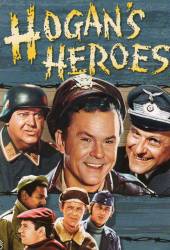The Great Brinksmeyer Robbery - S2-E18
Continuity mistake: As Kinch answers the question about the radio, he's in quarter profile to the locker with his shirt open. After the cut to a wider scene happens, he's turned toward the camera, and his shirt is half buttoned.
The Great Brinksmeyer Robbery - S2-E18
Factual error: In the restaurant in Hammelburg, where Schultz discovers Hogan and Newkirk, there's an advertisement for "Brauerei der Jager, Stadt Wien." (Wien = Vienna) Vienna and Hammelburg are more than 500km apart, and if Hammelburg were near Düsseldorf, where the series puts it, it would be more like 700km. That's a bit far away for a brewery to advertise in the pre-globalisation era.
The Great Brinksmeyer Robbery - S2-E18
Continuity mistake: When Hogan is trying to get the woman drunk, they take their first sip of brandy and put their glasses down. Hogan's is full, and he switches the full one for the empty one. He picks up the empty one with his right hand. When the camera cuts to a wide shot of the two of them, it's in his left hand.






Answer: It's a comedy, not a documentary.
stiiggy
Perhaps it was counterfeit. There are numerous episodes where they deal in counterfeit monies.